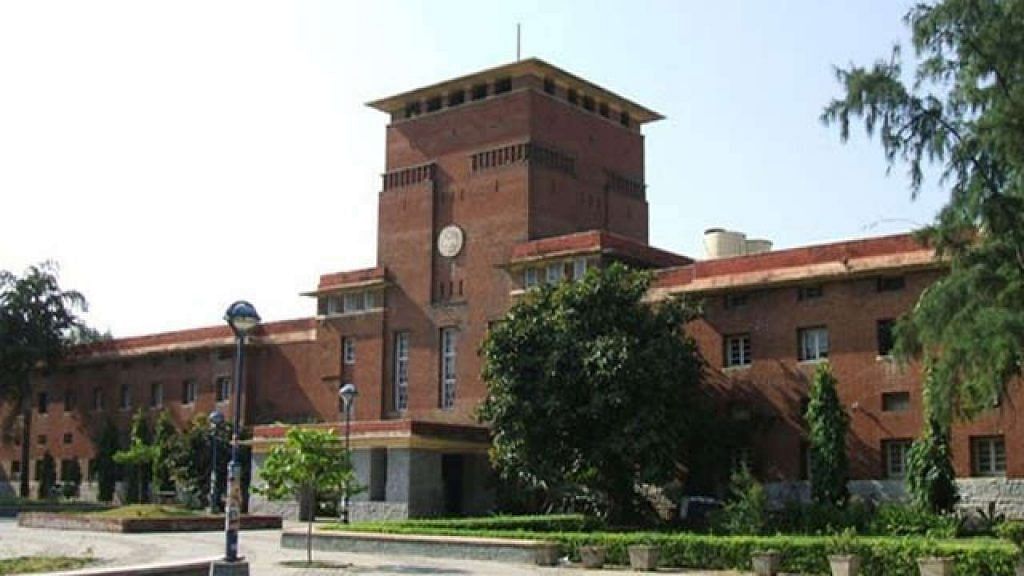New Delhi: Nine dedicated centres for subjects including climate change and public health and swanky accommodation facilities equipped for leisure activities such as shopping — Delhi University has big ideas for its upgrade as an ‘Institute of Eminence (IoE)’.
The university Monday submitted a detailed outline of its upgrade plan to the Union Human Resource Development (HRD) Ministry.
Under the plan, accessed by ThePrint, DU will set up nine more centres on the lines of its existing faculties for arts, music etc, besides bolstering accommodation facilities to further cement its credentials as a premier centre of education.
The plan took a long time to be finalised because discussions were held up in the DU executive council, the university’s top decision-making body, over some members’ concerns about a proposed fee hike. However, it was finally cleared on 29 February when four members in a quorum of 10 voted against the proposal, but six others — principals and deans of various departments — supported it.
Also Read: Modi govt ministers prefer Oxford, Harvard for their children’s education and not IIT, IIM
Institutes of Eminence
DU is one of several universities — including IIT-Delhi, IISc and Manipal University — that the government has shortlisted under its IoE scheme, which was launched in 2018 with an aim to put Indian institutes on the world education map. Currently, Indian presence on global excellence lists is negligible, with even the best universities failing to feature among the top 100.
The public-funded institutes selected under the scheme will get Rs 1,000 crore in aid from the government over five years, while private ones will get relaxation from University Grants Commission (UGC) norms on opening campuses and deciding fee structures and courses.
All institutes selected — 10 public-funded and 10 private — have been asked to submit detailed proposals about planned upgrades to bring themselves on a par with the world’s best. Each is obligated to implement the proposed initiatives for continued classification as an IoE.
‘Responding to present & future needs’
The nine schools DU plans to open will deal with public health, climate change and sustainability, governance and public policy, transnational affairs, skill enhancement incubation and entrepreneurship development, culture and heritage education, journalism and cloud computing, performing arts, and global history.
“The academic plan of the IoE proposal entails nine thematic areas with a number of sub-themes which underscore the conception of an interdisciplinary collaborative effort of the University of Delhi community,” the plan document reads.
The idea, it adds, is “to respond to present and future needs of the society and around the globe”.
The plan also proposes sprucing up, and enhancing, residential facilities for students. “At the moment, the university has accommodation of 3,522 students, which is 6.5 per cent of the student strength. We intend to take it to 5,000 students,” the document reads.
According to the plan, the facilities will be managed by professionals aware of modern managerial standards — a goal for which the university is looking to explore the ‘Public-Private Partnership (PPP)’ model.
“These areas would also have recreational, shopping and dining spaces. For budgeting purposes, 70 per cent of the budget will happen through PPP model,” the document states.
Among other things, the proposal obligates the university to raise Rs 95 crore for recurring expenses like salaries and Rs 350 crore for non-recurring capital expenditure by 2025.
Fee hike on the table
The proposed upgrade, however, will come with an increase in fees. “On operational expenses, including financial cost, the student fee structures need to be revisited from a pragmatic amenity perspective,” says the plan document.
Fears of a fee hike, ThePrint has learnt, were the primary factor holding up the plan in the executive council.
DU was selected as an IoE in September 2019. However, sources in the ministry said an MoU could not be signed so far because the university’s executive council did not give a go-ahead. The administration and the council, DU sources added, could not arrive at a consensus about what the plan should entail.
Speaking to ThePrint, members of the council opposed to the proposal said they believed it would compromise with the character of the university.
“We protested the IoE MoU because it compromises the character of DU, which has been providing quality education to students from all classes,” said Rajesh Jha, an executive council member and professor at the university.
“If they increase the fee, which they propose to do, education will become unaffordable.”
He said the proposal was cleared at an “emergency meeting” called by Vice-Chancellor Yogesh Tyagi on a notice of two days, leaving members with no time to examine the final plan in detail.
Another EC member said, “The proposal has commercialisation written all over it. This is the reason we were not approving it.”
However, supporters of the proposal described it as “progressive”. “It is a prestigious thing to be a part of the IoE,” said one of the six members who voted in favour of the proposal. “Why should we keep delaying the process?”
Also Read: Govt colleges wanted ‘Institute of Eminence’ tag for money, freedom, not excellence: Panel
